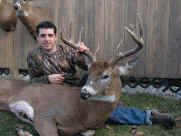À lire attentivement, surtout l'article de journal en anglais (en seconde moitié du message):
Les agents de protection de la faune du Québec, du Nouveau-Brunswick et d’Environnement Canada mettent fin à d’importantes activités de braconnage dans les régions de la Gaspésie et du nord du Nouveau-Brunswick
Pointe-à-la-Croix, le 25 janvier 2007 – Dès 6 heures ce matin, des agents de protection de la faune du ministère des Ressources naturelles et de la Faune du Québec (MRNF), du Nouveau-Brunswick et d’Environnement Canada ont mis fin aux pratiques illégales de chasse d’un groupe de braconniers qui exerçaient leurs activités principalement dans les régions de la Gaspésie et du nord du Nouveau-Brunswick. Cette opération, nommé « Renard croisé », a nécessité l’intervention de 90 agents de protection de la faune du Québec, de 27 agents de protection de la faune du Nouveau-Brunswick et de 14 agents de la faune d’Environnement Canada. Les actes de braconnage reprochés concernent principalement l’orignal et le cerf de Virginie. Dans de nombreux cas, de la viande braconnée a été acheminée illégalement entre le Québec et le Nouveau-Brunswick afin d’échapper aux contrôles provinciaux.
Deux années d’enquête ont permis aux agents d’accumuler les preuves nécessaires pour intercepter les individus. En tout, une cinquantaine de suspects de la région de Pointe-à-la-Croix et du nord du Nouveau-Brunswick ont été interrogés ce matin. Il est possible que d’autres personnes puissent être rencontrées au cours des prochains jours.
Opération « Renard croisé »
Actuellement, plus de 250 chefs d’accusation, en vertus des lois provinciales et fédérales, ont été comptabilisés. S’ils sont reconnus coupables, les individus sont passibles d’amendes pouvant totaliser plus de 500 000 $ au niveau provincial. Pour les infractions à la loi fédérale, les peines maximales sont de 300 000 $ et / ou emprisonnement pour une période pouvant aller jusqu’à cinq ans. Il est important de mentionner que la participation du maître-chien ainsi que celle du laboratoire d’expertise biolégale de la Protection de la faune du Québec ont permis de trouver et de confirmer différentes pièces à conviction dans le cadre de cette enquête. La Gendarmerie royale du Canada, la Sûreté du Québec et la Police de Listuguj ont également participé à l’opération de ce matin.
Les faits reprochés aux individus sont, entre autres, la chasse de nuit au cerf de Virginie à l’aide de projecteurs, la chasse de nuit à l’orignal, l’abattage d’orignaux femelles, le blanchiment de viande, la vente de chair d’orignal, l’utilisation de « call » électronique et l’utilisation de véhicule dans le but de pourchasser les orignaux, les estropier par impact puis les récupérer. L’enquête devrait également permettre de porter des accusations de possession illégale, de surplus d’abattage, ainsi que différentes infractions liées à la chasse aux cerfs et à l’orignal. Étant donné que les activités reprochées ont eu lieu au Québec et au Nouveau-Brunswick, l’enquête devrait démontrer que plusieurs individus étaient en possession illégale de viande braconnée et qu’ils ont également fait du transport illégal entre les provinces, ce qui contrevient à la loi fédérale.
L’opération d’aujourd’hui a mené à la perquisition et à la saisie de chair de gros gibier, de carabine de chasse, de deux camionnettes ainsi que de divers articles de chasse.
Éléments nouveaux
Actuellement, outre les personnes déjà rencontrées, certains éléments de l’enquête portent à croire que d’autres individus pratiquent des activités illégales de même nature dans les régions avoisinantes. En l’absence d’éléments nouveaux, les personnes fautives continueront à contrevenir aux règles en s’appropriant illégalement des ressources fauniques.
C’est pourquoi vous pouvez aider à résoudre les dossiers restés en suspens en signalant tout acte de braconnage ou geste allant à l’encontre de la protection de la faune, de ses habitats ou du milieu naturel en communiquant avec S. O. S Braconnage, pour le Québec, au numéro sans frais 1 800 463-2191. Vous pouvez également communiquer avec le bureau de la protection de la faune du ministère des Ressources naturelles et de la Faune du Québec le plus près (
www.mrnf.gouv.qc.ca/fr/faune-adresses-regions/). Ces services sont gratuits et confidentiels. Environnement Canada dispose également d’un numéro sans frais qui est le 1-800-463-4311, disponible en tout temps.
New Brunswick Telegraph-Journal - 2007.01.26 - Page A1
Daniel McHardie -Telegraph-Journal
COPYRIGHT: © 2007 Telegraph-Journal (New Brunswick)
'Barbaric' poaching operation busted
As many as 15 New Brunswickers are implicated in a suspected moose and deer poaching ring spanning the Quebec-New Brunswick border that has police examining 250 separate charges, including allegations of "barbaric" methods of killing their prey.
Operation Red Fox started two years ago with ordinary citizens complaining about poachers and ended at 6 a.m. Thursday when wildlife officers executed about 25 search warrants in Quebec and New Brunswick. The litany of charges facing the 50 suspected of poaching range from hunting white- tail deer at night with spotlights, selling meat across provincial borders and using a motor vehicle to run down moose.
Sheldon Jordan, Environment Canada's director of wildlife enforcement for the Quebec region, described the ring as organized crime driven by a "brazen disregard for wildlife and conservation." Along with 1,500 kilograms of meat and 10 firearms, the police seized two modified pick-up trucks that are being blamed for a "particularly inhumane way of destroying" the moose.
Jordan said the trucks each had a raised chassis, reinforced bumpers and protective grills. It is believed the poachers would travel the back roads of Quebec at night and when they saw a moose, they would blind it with a spotlight and then ram the confused animal with the vehicle, breaking its legs and then return in the morning for the carcass. And, Jordan said, if the moose tried to run for its life, the trucks would chase it down and crush its hind legs, drag the animal to the side of the road and come back when it was dead.
"You would probably wonder why anybody would do something so barbaric. The investigation so far shows, these are individuals who were prohibited from hunting, they had been caught poaching before," Jordan said. "Driving a truck along a road at night doesn't make a lot of noise, whereas firing off a couple shots from high-powered rifle makes a lot of noise. They were trying to avoid being caught by driving down roads in the middle of the night and then coming back the next day to recover the carcasses."
The two- year investigation involved 130 conservation officers from New Brunswick, Quebec and the federal government. The illegal activity in New Brunswick was based primarily in Campbellton and crossed into Quebec's Gaspé region. The poachers apparently took the meat across the border, trying to avoid provincial laws and would sell the illegal moose and deer.
Smuggling the meat into another province triggered the federal government's involvement.
Those arrested are accused of hiring two First Nations people to ride along with them just in case they were caught hunting at night with the spotlight. In that case, Jordan said the First Nations individuals would say they were invoking their constitutional right to hunt at night. But he said, those rights don't include carrying the meat illegally across the border and selling the meat for non- aboriginals.
Natural Resources Minister Donald Arseneault praised the work of the conservation officers on both sides of the border in bringing charges in this case.
"These are very serious offences and I'm very happy that we worked in co-operation with our neighbours in Quebec as well as our federal counterparts to put an end to this," Arseneault said. "These are very serious charges and they are going to be facing very serious penalties."
More information is being collected in the investigation, raising the possibility of even more charges in the future.
There are more than 250 federal and provincial charges being considered with possible penalties reaching more than $500,000 for provincial contraventions and $300,000 and five years of imprisonment for the assorted federal violations. Quebec's Ministry of Natural Resources underscored the importance of the Quebec Wildlife Protection dog detector team and forensic laboratory in tracking down different pieces of evidence.
Now that the search warrants have been acted upon, Jordan said the file is being turned over to the Crown prosecutors and charges could be forthcoming in a few months.
The dynamic of the organized poaching ring is still being explored but the federal spokesman said these groups tend to work in small, loosely related, cells.
"I can't tell you the number of cells because everything has changed so much in the last few hours," he said. "However, often there will be several different cells with limited communication between them not knowing that there are other cells. But when you actually come to it, there are one or two people that know what's going on everywhere."








